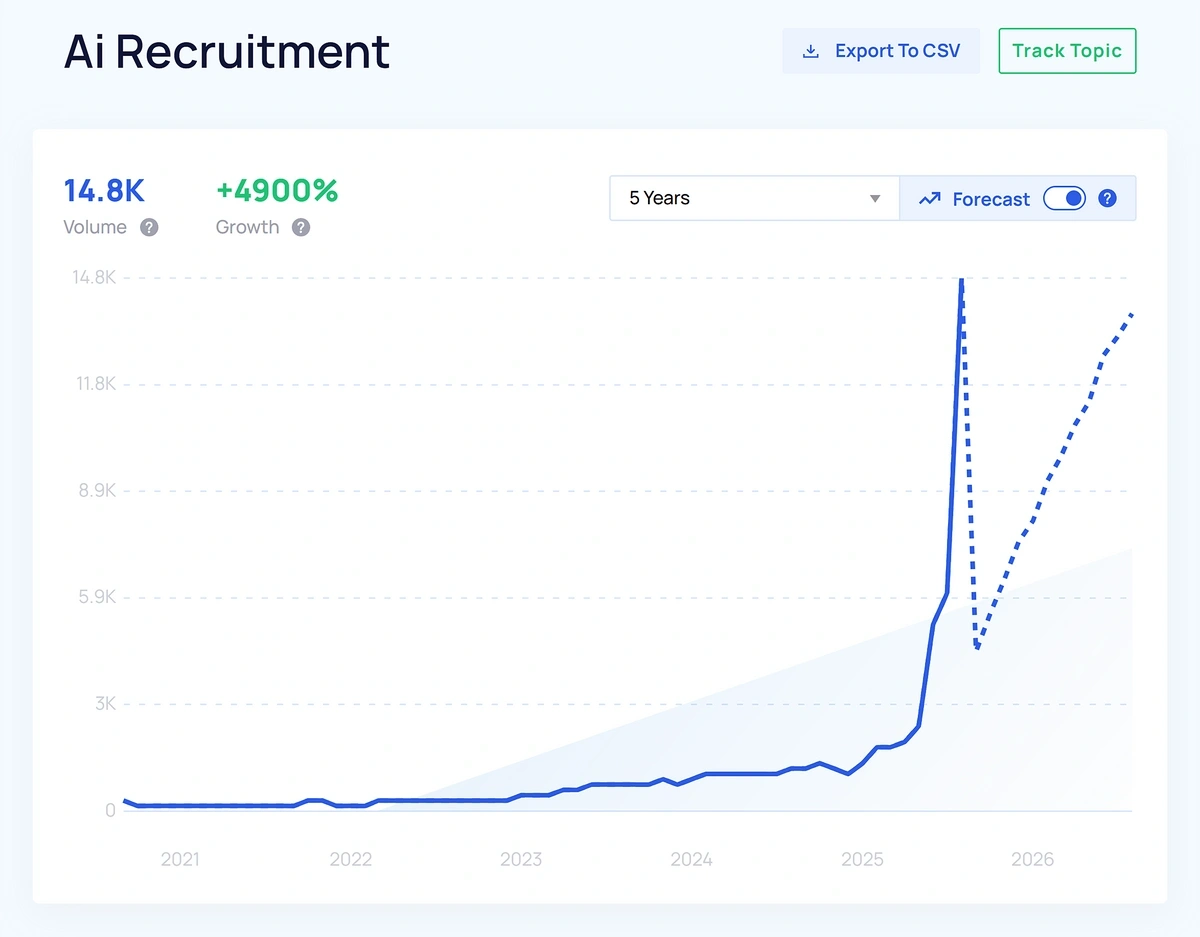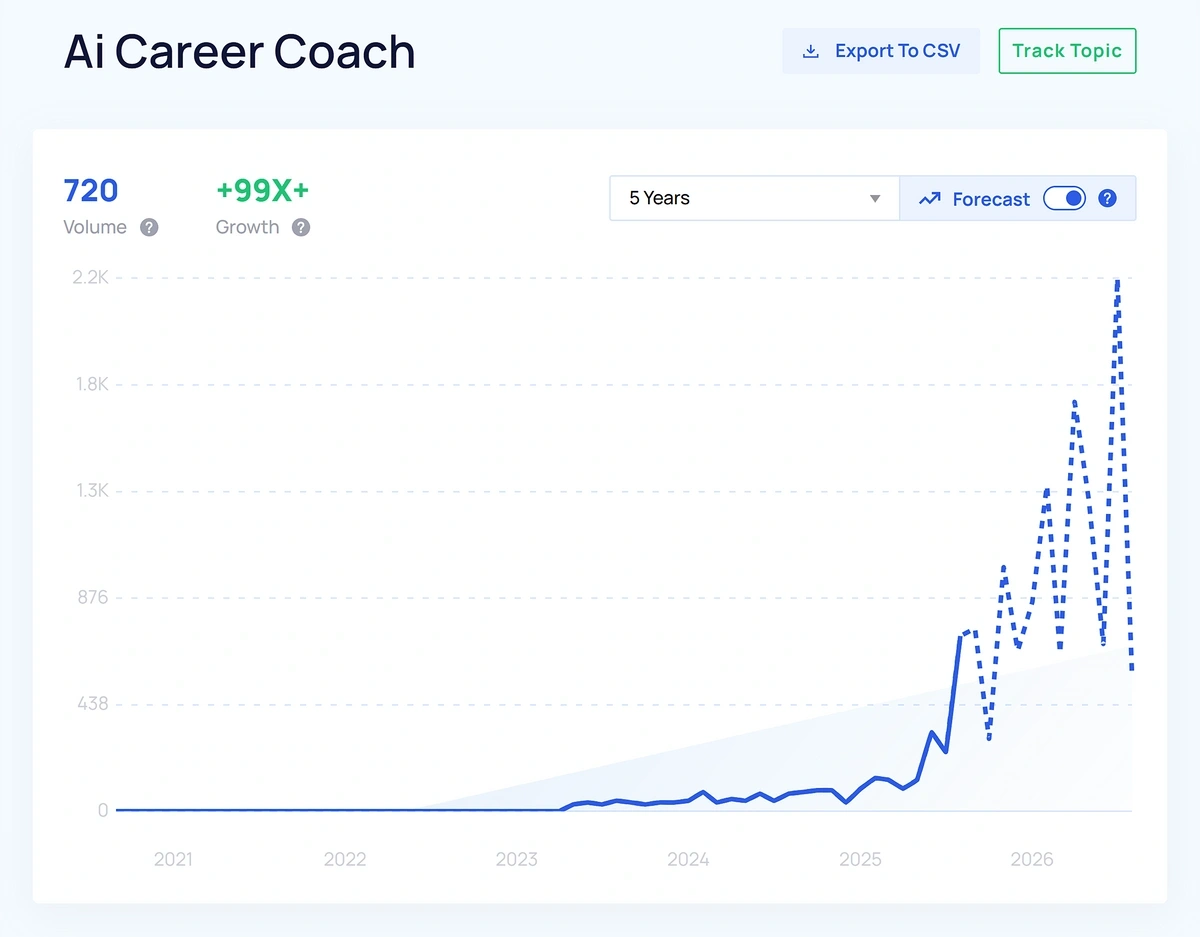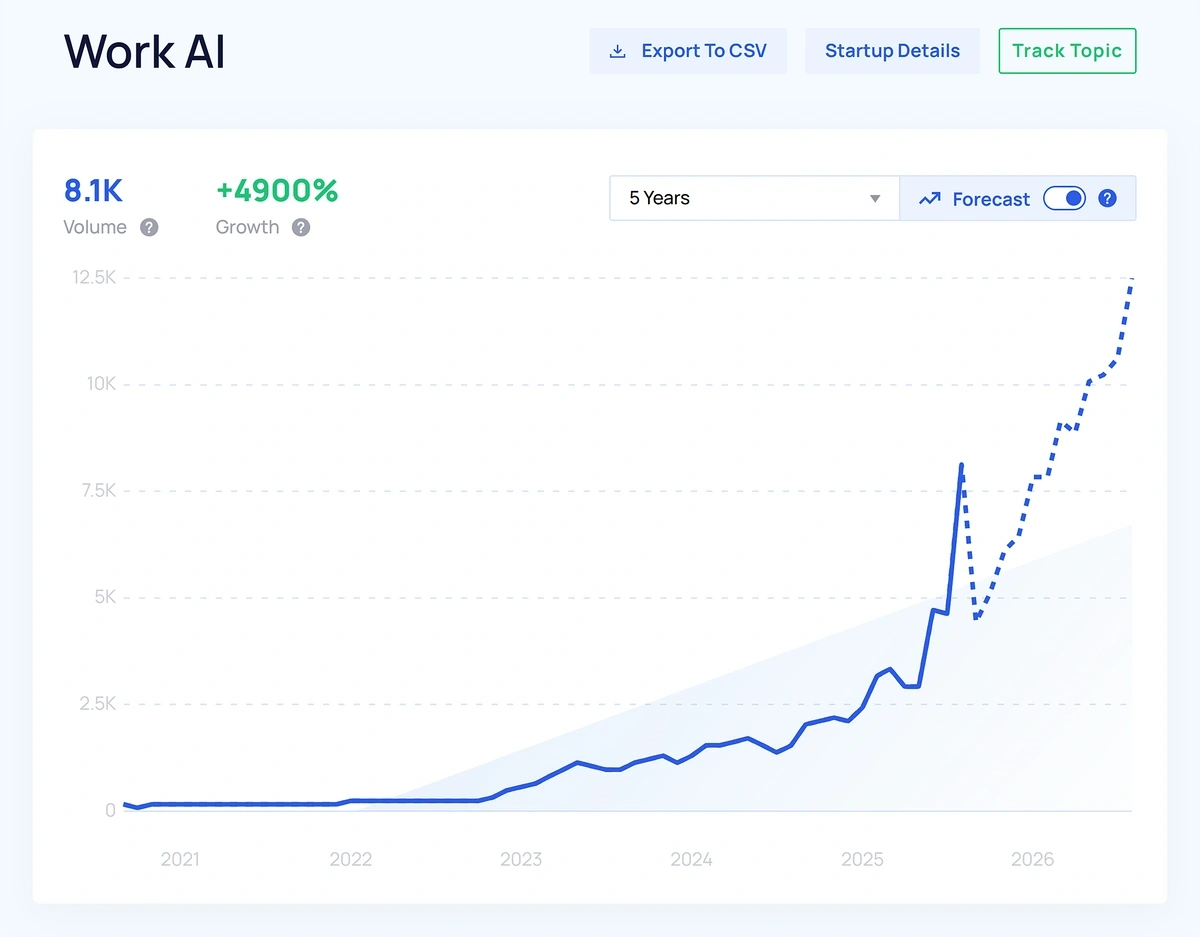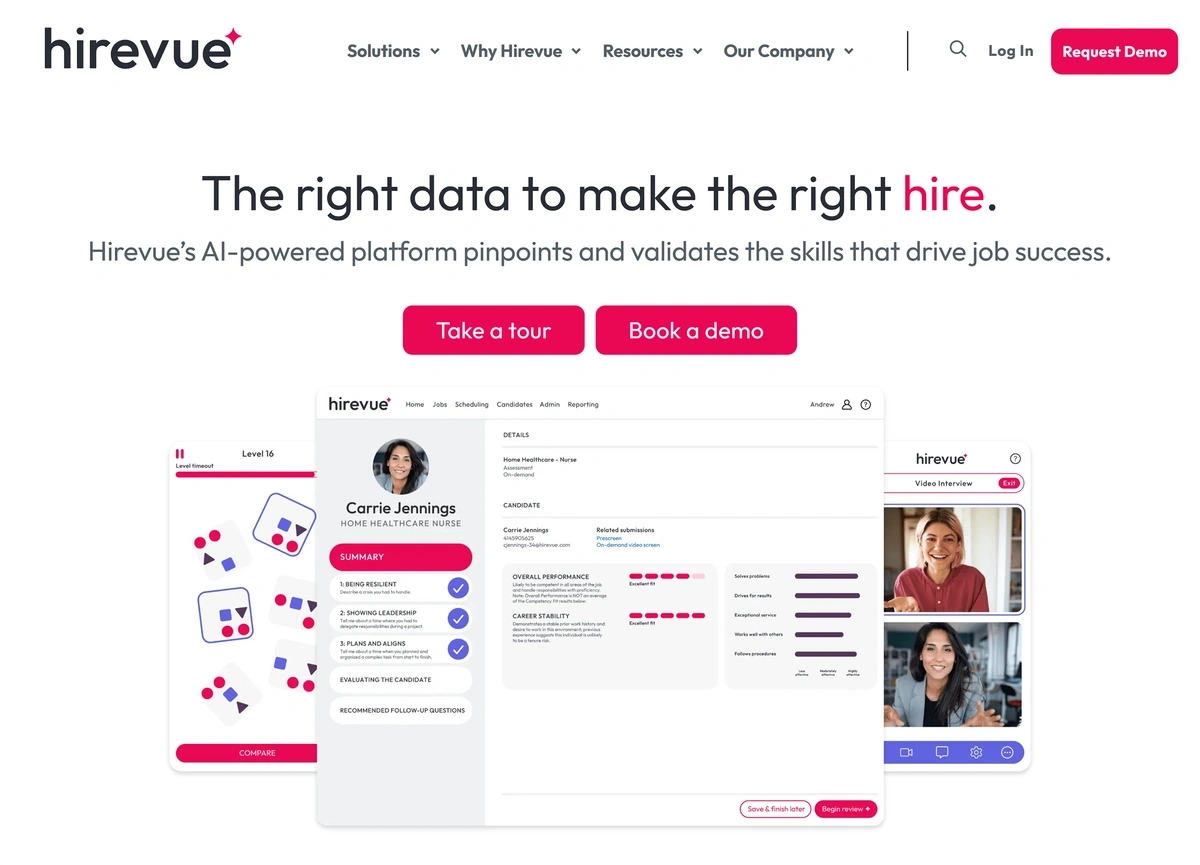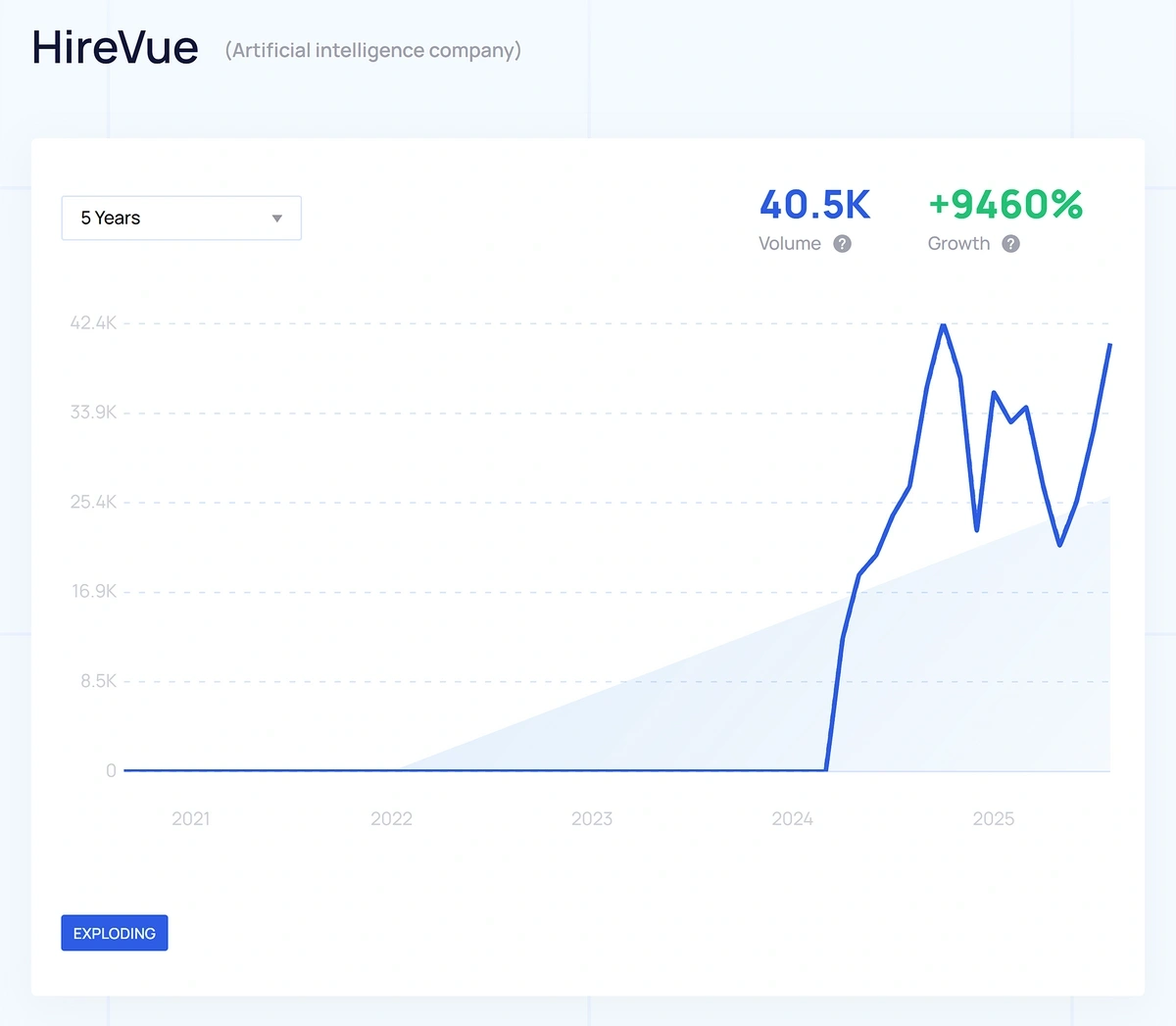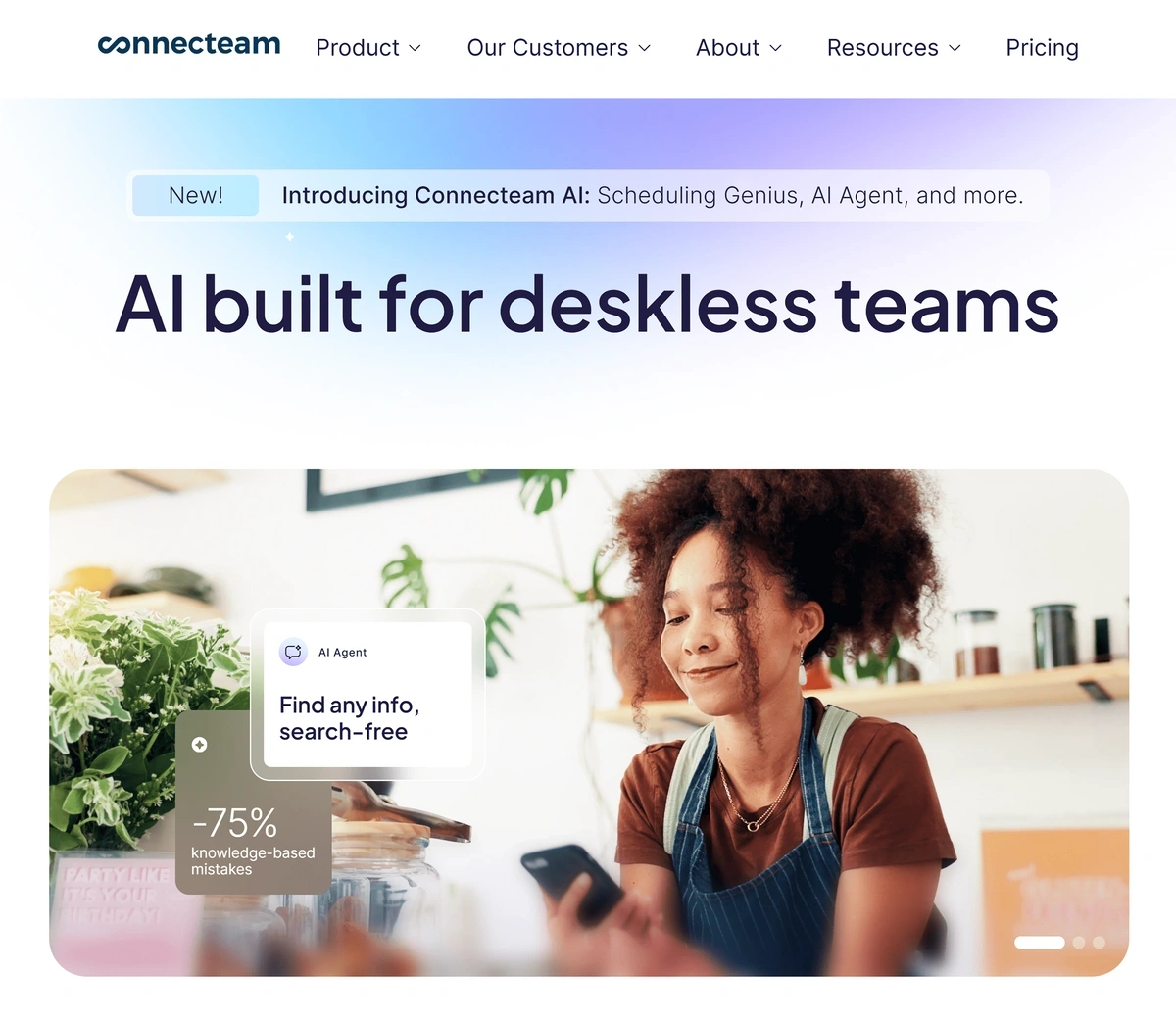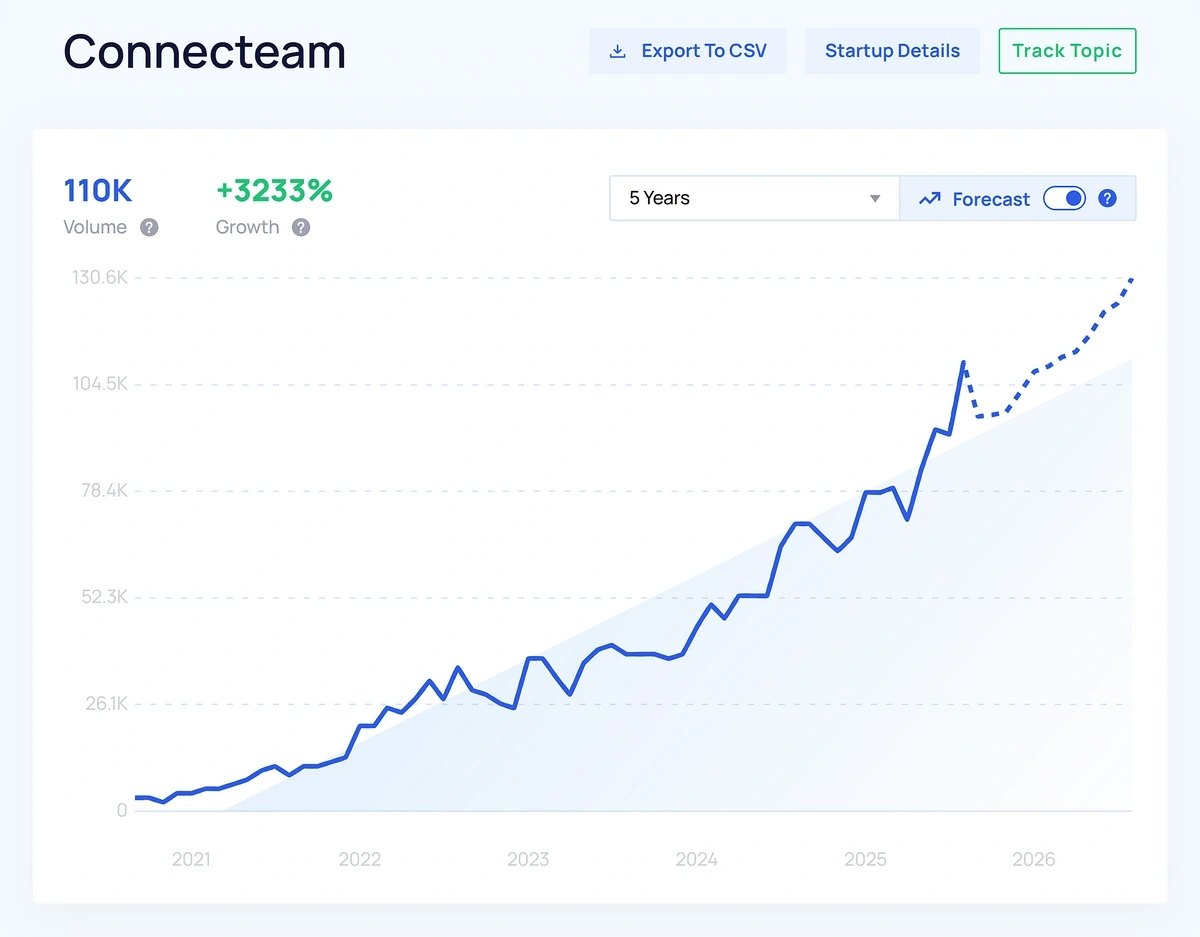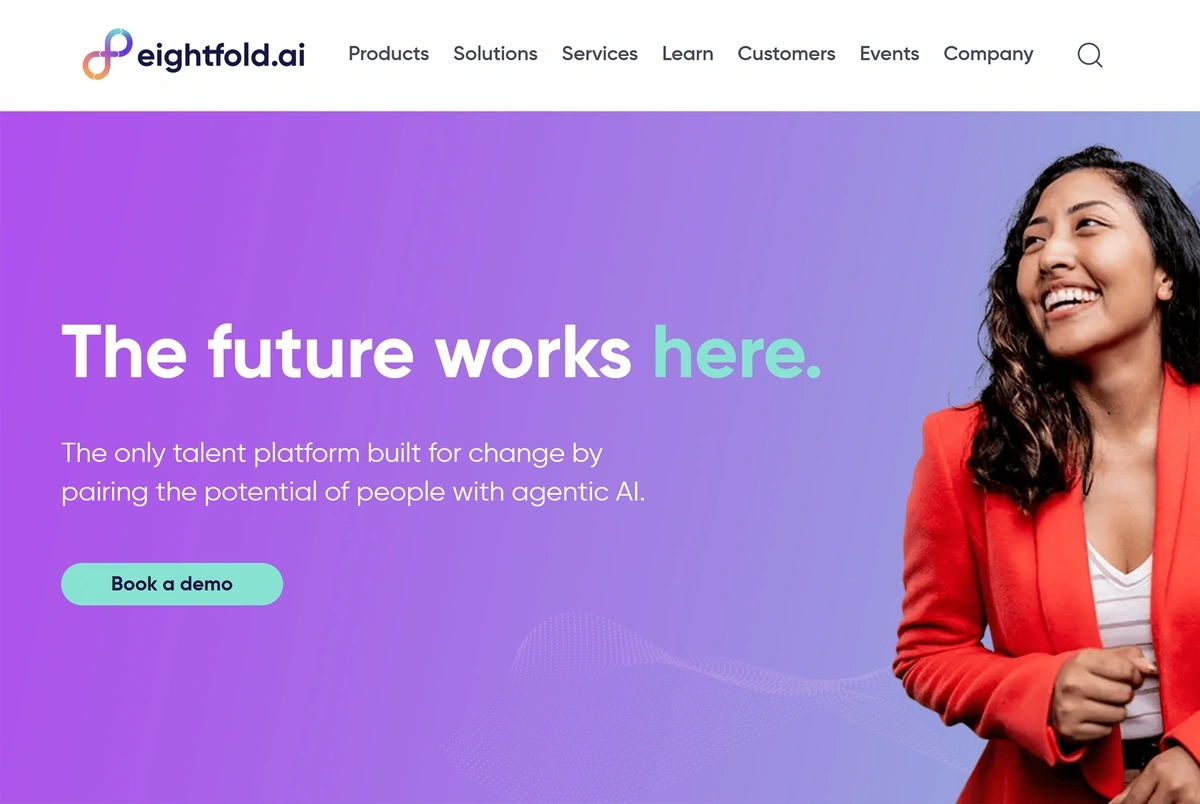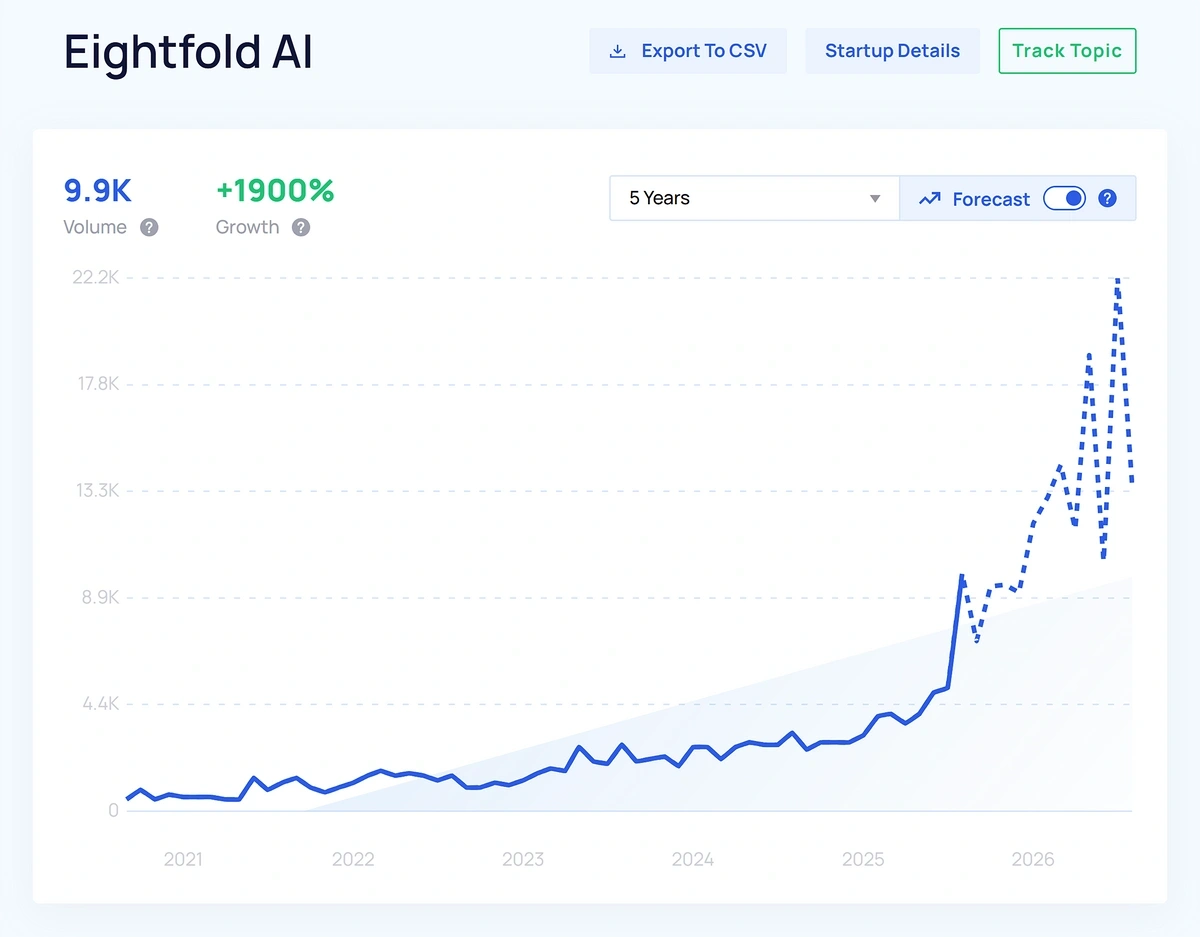Get Advanced Insights on Any Topic
Discover Trends 12+ Months Before Everyone Else
How We Find Trends Before They Take Off
Exploding Topics’ advanced algorithm monitors millions of unstructured data points to spot trends early on.

Features
Keyword Research
Performance Tracking
Competitor Intelligence
Fix Your Site’s SEO Issues in 30 Seconds
Find technical issues blocking search visibility. Get prioritized, actionable fixes in seconds.
Powered by data from
AI for Human Resources: Trends and Top Tools (2025-2026)
Human resources teams, like so many others, are interested in using artificial intelligence (AI) to streamline their work and reduce time-consuming, repetitive processes.
HR professionals may find they run up against more limitations than their colleagues in marketing or sales, though. This is because HR teams process personally identifying information (PII) about candidates and employees. Company policies or regional laws may dictate that HR departments can’t share PII with any off-the-shelf AI tool.
Luckily, there are a growing number of purpose-built AI tools for sourcing, employee engagement, and talent management. This guide walks through everything you need to know about how to start using AI in HR—and which tools other HR pros are interested in right now.
Top Takeaways
- Predictive analytics and natural language processing (NLP) make AI tools well suited to carrying out specific functions in the employee management or hiring process
- HR leaders are exploring how to use AI for administrative operations, job posting, talent acquisition, interviews, and onboarding.
- Other areas of interest include post-hire employee engagement, training to close skills gaps, and performance management.
- While recruiters may use AI-driven data collection to help make hiring decisions, for now, people still drive the process.
- We’re seeing a sharp increase in searches for AI tools right now, and we’re forecasting that interest will grow through 2026 and beyond.
- Popular topic searches include using AI for resume scanning, onboarding, and digital coaching.
- Jobseekers want to use AI technology, too, particularly for resume creation, interview prep, and skill development.
How are HR Teams Using AI?
You can find AI in use across both talent-facing operations and on the administrative side of HR offices.
Administrative Operations
Companies use AI to automate routine tasks and time intensive HR processes like writing job descriptions and scheduling interviews.
Some teams are even using AI to run first-level interviews with candidates. The tools can record video, generate variants of important questions, and provide recruiters with summaries after each call.
Using AI this way frees human team members up to handle sensitive, confidential, and strategic work. It also gives HR experts more time for one-on-one meetings with colleagues and company employees who need help.
Talent Acquisition and Recruitment
Interest in AI recruitment tools has grown by 4900% in recent years, with the biggest spike in searches projected to happen in 2026.
AI recruiting software can take several forms but typically involves automatic resume screening and candidate matching.
Recruiters can specify what kinds of qualifications and experiences they’re looking for in an ideal candidate; the tool will put together matches that could be a good fit.
Jobseekers are using AI during the application process, too. Interest in AI-powered resume checkers is up by over 2700%, and we expect a large spike in searches for AI career coaches in 2026.
AI can also help recruiters maintain a curated pipeline of top talent. Even if someone isn’t the right fit for a role now, they may be in the future. AI-generated email sequences can nurture the candidate’s interest, and AI-powered matching tools can continue to scan for roles that might be a better option based on someone’s skills.
Onboarding
AI tools can streamline the onboarding process for new employees, too. Recruiters and hiring managers can use generative AI to:
- Turn standard operating procedures (SOPs) and company documents into interactive learning paths.
- Create chatbots to quiz new hires on important company policies or answer questions from trainees.
- Analyze hires’ performance and ability to master training topics, then create feedback summaries to offer further guidance and suggestions for improvement.
And if companies want to, they can use AI to make a shift from in-person or live Zoom training sessions to an asynchronous model. Tools like Synthesia allow you turn text scripts (even ones made with ChatGPT) into videos with realistic computer-generated people and voices.
Employee Experience and Training
Our data shows that an increasing number of business leaders are interested in AI-powered learning paths and support tools for their existing workforce, too—not just new hires.
Searches for Workai, a platform that lets HR teams use AI to communicate with (and measure engagement among) remote and hybrid teams, have grown by almost 5000% in the past five years.
Companies can use Workai to build “workplace buddies” to answer questions, summarize training topics, and turn company documents into AI-generated learning paths.
Pros and Cons of Using AI for HR
Many HR departments are interested in AI due to the technology’s ability to streamline repetitive tasks. And this does have the potential to be a big positive for many recruiters and HR representatives.
If workers can hand off the responsibility of reviewing 500 resumes to an AI, then they’re free to work directly with employees or hold high-level interviews.
Plus, the HR data processing power of AI tools means teams can analyze company information and spot issues, gaps, and patterns that help them improve the workplace.
Some of the most popular AI HR tools on the market right now claim to reduce “human bias” and allow more candidates to get a chance to interview. While those claims may be true, it’s important to note that large language models (LLMs) can introduce new forms of bias into a process.
This is called “algorithmic bias” and it happens because of other biases present in the LLM’s training data. As such, it’s essential that anyone using AI in HR have a good understanding of:
- The tool’s limitations
- How the tool processes and stores employee or candidate data
- What’s in the AI algorithm training data and if the data is evaluated for bias
Finally, teams will want to explore different mixes of AI and human involvement in:
- Recruiting
- Onboarding
- Employee development
The trick is to find the best blend of AI and human interaction. If candidates only experience interactions with an AI, for example, they may be turned off from the role due to a lack of a human touch.
3 AI Tools for HR Managers to Check Out
The world of AI HR software is vast, and growing rapidly. These three tools are attracting attention right now.
Hirevue: Best AI Interview Software
Hirevue is an established AI interviewing platform that offers tools for engaging candidates in a variety of interview formats.
Recruiters can:
- Use generative AI to chat with job applicants over SMS or Whatsapp
- Build lists of interview questions that are, according to Hirevue, meant to reduce bias
- Watch recorded video interview responses
- Summarize interview performance and interviewee skills
- Create tests for prospective hires
Hirevue’s focus on one thing — interviewing — means it won’t be the only tool an AI-first HR team will use. But the company’s consistent dedication to improving this one key part of the recruitment process has helped it maintain steady interest and use levels among HR leaders for years.
Connecteam: Best AI For Retail and Service Industry HR
Connecteam is a personnel and operations management tool to helps managers and HR teams connect with distributed employees.
The app is designed to meet the needs of companies with brick-and-mortar or on-site operations, including:
- Retail shops
- Restaurants
- Construction services
- Home repair businesses
Companies using the Connecteam AI can:
- Create chatbots to answer employee questions
- Automatically plan schedules based on availability and demand
- Generate personalized learning materials
- Turn photos of forms into digital documents
These features are in addition to the core Connecteam product that includes a time clock, chat tool, knowledge base, time off request system, and more.
Eightfold.ai: Best AI Agent Tool for HR
Eightfold.ai lets human workers create “digital twins” that act as an AI proxy for:
- Answering questions
- Sharing institutional knowledge
- Replicating work patterns
If a worker creates a digital twin before leaving their role, the resulting AI agent can train new hires on their predecessors’ work, responsibilities, client accounts, and more.
Eightfold.ai offers an interesting and highly personalized take on agentic AI for onboarding, so we’re not surprised to see interest in the tool is spiking.
What’s the Best Free AI Tool for HR?
You’re going to need to pay for any AI tool that’s used with HR projects. Whether you want to use a general-purpose AI tool like Claude or a dedicated HR AI system, the paid versions of tools offer:
- Better data privacy protections
- Access to advanced features
- Multi-user licenses so you can share the things you build with your colleagues
For example, when using Claude, paid “Claude for Work” users can build apps and tools, then share them with other users on the same company plan.
What’s the Future of AI for HR Departments?
We expect that interest in AI-based for HR will continue in a similar vein as teams continue to seek out process optimization tools.
As jobseekers become more comfortable with directly talking to an AI system, though, we may see an even greater emphasis on tools for conducting AI interviews. And on the jobseeker side, this could lead to an even higher spike in digital coaching and AI resume writing solutions.
All the trend and tool projections in this article come from Exploding Topics. Our trend database is continually updated to reflect the most popular topics, services, and products in the HR space — right now through the year ahead.
You can get access to this forward-looking HR industry data, too, with a seven-day free trial of Exploding Topics Pro. Exploding Topics is one more way you can use the power of machine learning in your HR planning, projections, and strategy development!
Stop Guessing, Start Growing 🚀
Use real-time topic data to create content that resonates and brings results.
Exploding Topics is owned by Semrush. Our mission is to provide accurate data and expert insights on emerging trends. Unless otherwise noted, this page’s content was written by either an employee or a paid contractor of Semrush Inc.
Share
Newsletter Signup
By clicking “Subscribe” you agree to Semrush Privacy Policy and consent to Semrush using your contact data for newsletter purposes
Written By


Emily is a freelance content writer at Exploding Topics. A former news correspondent, she has over 15 years' experience creati... Read more




